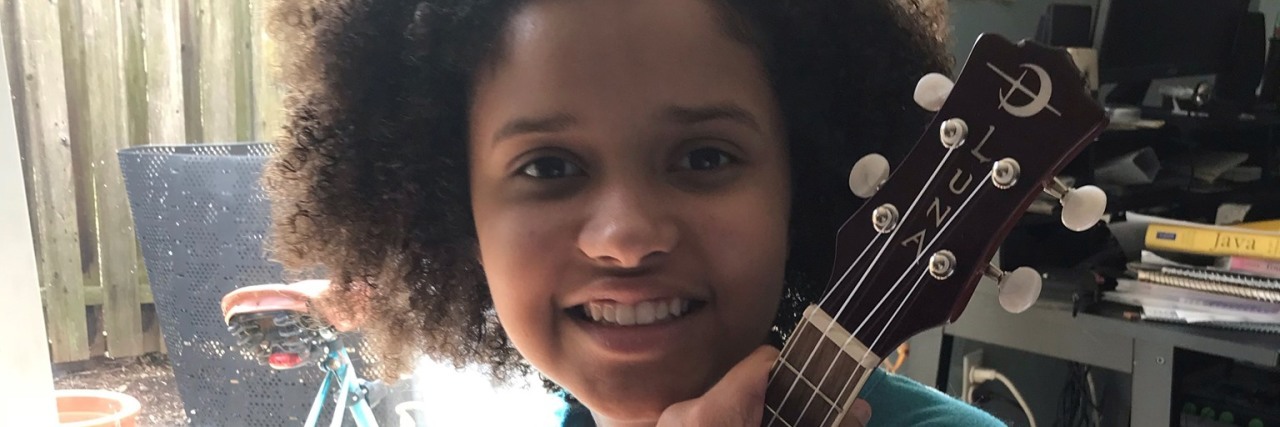How Music Has Opened Doors for My Autistic Daughter
I still remember my daughter’s first piano recital at her talent show in elementary school. I think I forgot to breathe at times. It was beautiful and so was she.
My daughter Jade was diagnosed as autistic at 2 years and 8 months. I knew absolutely nothing about autism before this. I was surprised girls could be autistic. At that age, Jade could only name objects. We learned early on that there is no one approach to support her communications needs. There was no one piece of “right” advice on therapy or methods. We needed to experiment. It was trial and error. I was lucky enough to have an older cousin, Patricia, who has an autistic son. She advised us to focus on Jade’s strengths and not her challenges.
When Jade was a little over 3, I noticed how mesmerized she was by the Leap Pad toy Violet and the Small World Classical Music blocks that had singing and musical sounds. She would play them over and over and over again. We decided we should try and see if this love for music could support her communication needs. It was as simple as that.
We started with a music time for tots program and then investigated music therapy. Through trying music therapy, where music is used as the vehicle to support communications goals, we met an amazingly talented musician specializing in working with kids with disabilities. He saw real potential in Jade. We realized she could learn to play specific instruments. We enrolled her into an academy when she was a little over 4 with an amazing piano teacher, who welcomed her into a group class learning the piano course “Harmony Road.” She broke music down into small pieces and it worked well.
Jade is now 11. She can play the piano and is learning drums, ukulele and guitar. Along the way, we discovered talents in memorization and pitch, but most of what she has learned has been through the support of amazing music teachers, practice, and us cultivating opportunities for her to play and learn individually and in groups. I have learned three important lessons that I hope will be useful for parents who want to make music a big part of their autistic child’s life:
1. Music is great for your child’s communication.
Research on music’s impact on autistic people shows that individual music intervention can improve social communication and functional brain connectivity. We believe Jade’s ability to talk in sentences now, and her growth in communication through using scripts from songs, rhyming and some of her flexibility can be attributed in part to her love of music and singing.
2. The right teacher matters.
Finding the right teacher is crucial. It isn’t essential that teachers know everything about autism, but they need to be willing to be flexible, try different strategies and have an open mind to work with your child. We found our teachers through word of mouth and by reaching out to music schools. There was a lot of trial and error, and we had to be upfront about Jade’s diagnosis. We also had to be willing to go to music classes to provide support.
We found you have to find the approach that works for your child, whether “child-led” that builds on your child’s interest to support music development or picking the right early learning strategies. Jade has worked best with teachers who used her strengths in memorization and pitch but pushed her to grow and learn to read music, showing her their expectations for her to mirror.
3. Be prepared to battle discrimination.
While some people and businesses welcomed us with open arms, others made us feel that Jade did not deserve to be in the same space with their kids. Every time we enter a new music program, we would have to justify her presence there. Not all spaces and parents will make you feel welcome in group classes, especially if your child has difficulty keeping still, requires repetition, or has challenges communicating. A good teacher can address some of these issues by how they run the class. At one piano recital, a parent demanded we leave because my daughter was talking to herself. You have to be strong and determined and rely on schools that won’t discriminate and will work with you to provide the right learning environment.
While it may be difficult at times, music has been exceptionally rewarding for my daughter. Everything we have discovered on this journey into music has been worth it. Jade sings every day and is always listening to music, including using new technology and apps to help her like Yousician, Piano Maestro, Rhythm Swing, Flash Note and now Garage Band. We have lots of hopes and dreams for her future, despite all the challenges still ahead. Music does not have to be a career goal for all autistic kids, but the benefits of incorporating it into your toolbox of approaches outweigh any cons. Music can help open doors, open up friendship opportunities and just bring pure joy to your autistic child.
Follow this journey on Autism, Girls and Music.

